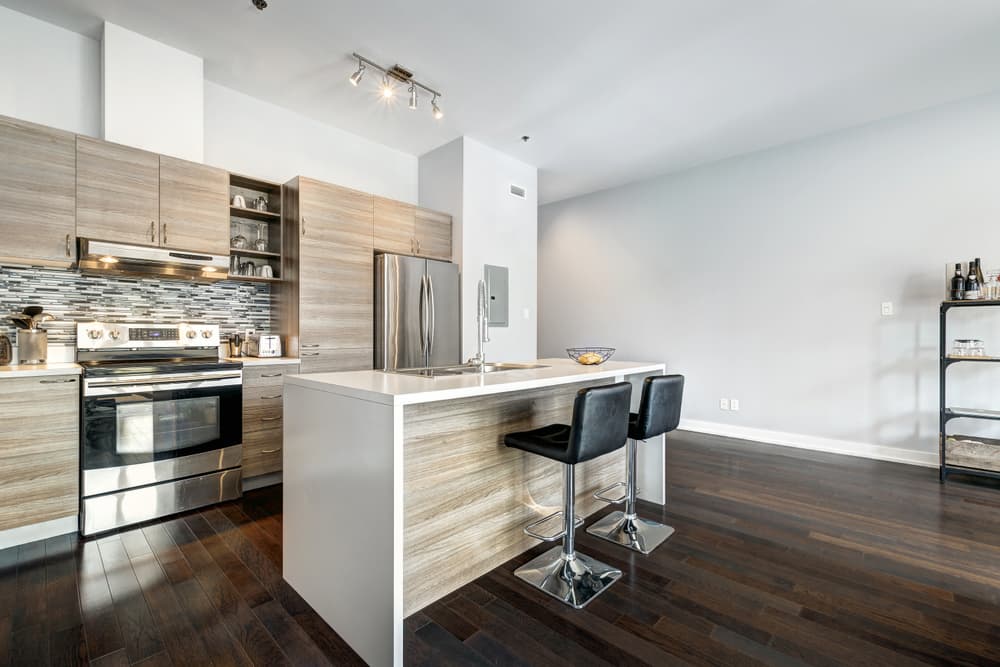
When you’re searching for your next home, there are plenty of decisions you’ll have to make throughout the process. But one of the first – and perhaps most important – choices is the type of residence you want to live in.
For many people, it can be confusing to figure out the differences between seemingly similar types of homes. In fact, one of the most commonly asked questions we hear is, “What is the difference between a condo and an apartment?”
Even though apartments and condominiums might seem to be the same, there are some key differences that can help you make the right decision for your future.
What’s the Difference Between an Apartment and a Condo?
The most important difference when comparing apartments vs. condos is the ownership:
- An apartment is a residence that is rented by the resident
- A condo is a residence that is owned by the resident
There are also differences in the property taxes:
- Apartment property taxes are paid by the landlord/property management company, not the resident
- Condo property taxes are paid by the resident/owner
This means that an apartment and condominium that are basically the same in terms of location, amenities, and size won’t necessarily equal the same monthly cost.
There are many similarities between apartments and condos: both are usually located in a larger residential building and community, and their communities may feature amenities such as a pool, green spaces, fitness centers, and the like. However, the foundational differences between apartments and condos are usually enough to help someone decide which is ideal for them.
Apartments vs. Condos: What to Consider
If you’re weighing your options between a condo and an apartment, there are plenty of factors to consider.
First and foremost, ask yourself if you’re prepared to be a homeowner – and manage all of the responsibilities that come with it. For many people, renting is far more convenient and suitable to their desired lifestyle. That alone could be enough to make your decision clear.
However, there are other things to consider as well, including:
- Cost: You might assume that the cost of an apartment and the cost of a condo would be pretty comparable on a month-to-month basis. However, that isn’t necessarily accurate.
- In an apartment, you generally know what to expect when it comes to your expenses. Usually, you’ll pay a deposit when your lease begins, and sometimes the first and last month’s rent is also required. Then, you’ll pay your monthly rent, which is clearly outlined in your lease agreement.
- In a condo, the costs are more complex (and often more expensive). First, you’ll have to pay a down payment (as much as 20% of the purchase price), as well as closing costs for your mortgage. Additionally, you’ll most likely need to budget for a home inspection, as well as potential repairs or other upfront expenses. Living in a condo also comes with HOA dues, which can vary widely depending on location, services, and amenities.
- Maintenance: As a condo owner, you’ll be taking on far more responsibility than you would living in an apartment.
- When something goes wrong in an apartment, it’s usually the responsibility of the landlord/property manager to repair it. They will either send in their own maintenance team to take care of the issue, or provide the funds for you to arrange repairs on your own.
- If there are repairs needed for a condo, it’s up to you to foot the bill. Home repairs can range from under $100 to thousands of dollars, and can put a major stress on your finances.
- Rules and regulations: Both apartments and condos come with certain rules and guidelines for residents, but the impact of these regulations might be greater in a condo.
- In an apartment, your lease agreement will outline expectations for behavior in common areas, whether pets are allowed, and how much you’re allowed to alter the interior and exterior of your home.
- In a condo, you’ll usually have to adhere to similar expectations for the use of common areas, as well as any other community rules. But in addition, you’ll also have an HOA to contend with – and they can implement regulations on everything from your home’s exterior and landscaping to where you park your vehicle, even if it’s on property that you technically own.
Who is an apartment best for?
Apartments are an excellent option for individuals that want to enjoy freedom from the hassle and expense of home ownership, without sacrificing quality, style, and amenities.
What you’ll find in apartments
Of course, the quality of apartments can vary based on the community – which is why our team recommends choosing wisely when it comes to selecting your future home.
For example, some apartments might have small, outdated floorplans, basic finishes, and next to no amenities. There are plenty of poorly maintained apartments out there, leaving residents feeling frustrated and unhappy with their subpar quality of life.
But on the other end of the spectrum, there are also apartments that deliver the ultimate in luxury living: spacious residences, beautiful communities, and countless amenities. The homes from Anderson Communities all meet an industry-leading standard of quality, so you can be confident that you’re moving into a place you’ll be proud to call home. In our homes, you can look forward to:
- Modern, open floorplans
- Close proximity to excellent schools, shopping, and dining
- Newly-renovated residences with upgraded finishes
- A broad range of square footage options
- Walk-in closets
- In-home washer and dryer
- Outdoor living spaces
- Internet/cable
Benefits of living in an apartment
In an apartment, you’ll enjoy your fair share of advantages, including:
- Flexibility: If you purchase a condo, you are tied to that property until you’re able to resell it. Unfortunately, that can put you at the mercy of the real estate market, making it difficult to relocate when and where you want to. But in an apartment, you have far more freedom to relocate whenever you’re ready. An apartment lease is usually valid for one year, after which you can choose to renew your lease or move.
- Virtually zero maintenance: Unlike condo owners, apartment residents don’t have to worry about dealing with pricey home repairs, landscaping, exterior maintenance, and the like. The landlord/property manager takes care of all those tasks, saving you time, money, and stress.
- Location: The majority of apartment communities are located near local amenities, including schools, restaurants, stores, and more. In contrast, while some condos may have a central location, others could be tucked away further from the highlights of an area.
Discover a New Way of Life in a Home from Anderson Communities
As a resident of Anderson Communities, you’ll enjoy a myriad of amenities, a comfortable and luxurious home, and an unmatched quality of life. While understanding the differences in a condo vs. apartment is extremely useful in your home search, even more important is finding a community where your happiness is a top priority.
Unlike many condos for rent in Kentucky, including those from private landlords and large property management companies, our homes are designed to provide the very best in style, ample space, and location alike. And here, you won’t have to sacrifice your dream home in order to meet your budget – Anderson Communities is committed to offering affordable options and 100% transparent pricing, making it easy to find the right home to suit your needs. Contact us if you have any questions.
Explore our currently available homes for rent in Lexington, Georgetown, Versailles, and Louisville today!
Featured Image: [Anatoli Igolkin/Shutterstock]



